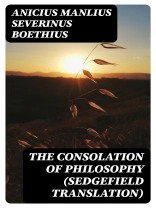In ‘The Consolation of Philosophy, ‘ Boethius eloquently explores the profound themes of fate, fortune, and the nature of true happiness through a dialogue with Lady Philosophy. Written during his imprisonment, this seminal work marries the elegance of Classical philosophy with the emerging contours of Medieval thought. Employing a blend of prose and verse, Boethius crafts a rich tapestry that reflects the tension between external circumstances and internal virtue, rendering it a cornerstone of both philosophical and literary discourse in the Western tradition. Anicius Manlius Severinus Boethius, a Roman philosopher and statesman, lived during a tumultuous era marked by political upheaval and personal tragedy. His extensive education in the Platonic and Aristotelian traditions, alongside his high-profile roles in the court of Theodoric, uniquely positioned him to grapple with life’s uncertainties and the quest for meaning. This personal context profoundly influenced his reflections, as he faced the stark realities of fortune’s capriciousness. I highly recommend ‘The Consolation of Philosophy’ to anyone seeking solace in times of despair or pondering the philosophical intricacies of life. Boethius’ insights continue to resonate, offering timeless wisdom that transcends cultural and historical boundaries, encouraging readers to find peace through intellectual contemplation.
Over de auteur
Anicius Manlius Severinus Boethius (c. 480-524 AD) is a towering figure in the annals of Western philosophy and literature, often regarded as the last of the Roman intellectuals and one of the earliest scholastic philosophers. Born into a prestigious Roman family, Boethius went on to assume a number of important political positions, including senator and consul, before falling out of favor with the Ostrogothic king, Theodoric the Great. This misfortune led to his imprisonment and eventual execution, during which he composed his seminal work, ‘The Consolation of Philosophy’ (Sedgefield translation). In this magnum opus, Boethius addresses the vicissitudes of human fortune, the fluctuating nature of happiness, and the pursuit of the highest good. The timeless text merges Neoplatonic and Christian thought, reflecting Boethius’ profound engagement with Greek philosophy, particularly the teachings of Plato and Aristotle. ‘The Consolation of Philosophy’ has had a lasting influence on Western thought, contributing significantly to medieval Christian philosophy and Renaissance humanism. The elegant prose and poetic meter of the text reveal Boethius’ literary finesse, firmly establishing his reputation as a philosopher-poet. The work has been translated numerous times, and Sedgefield’s English translation has contributed to its accessibility and enduring legacy. His intellectual contributions continue to resonate with scholars and readers interested in the intersection of philosophy, theology, and literary form.












